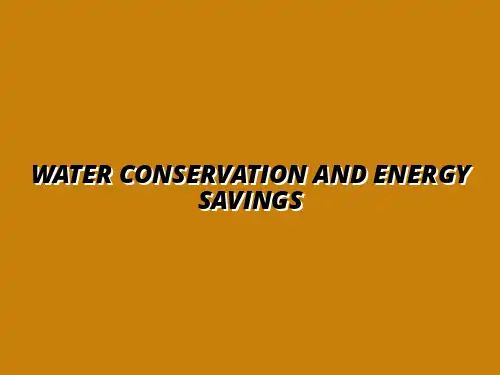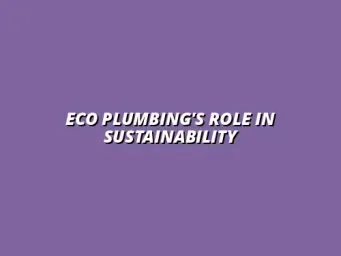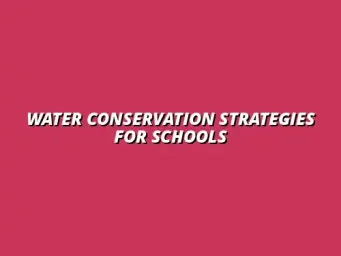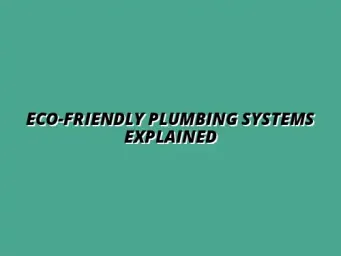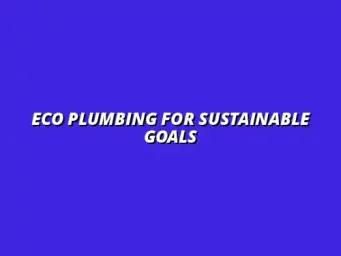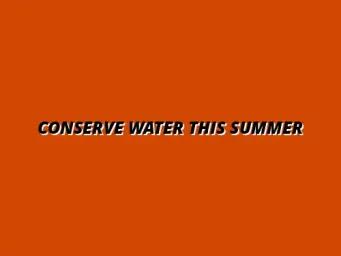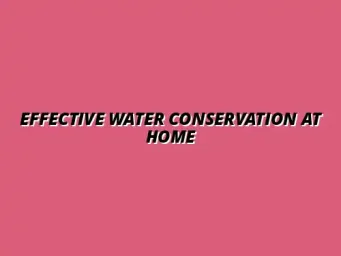The Interrelationship Between Water Conservation and Energy Savings
Water conservation and energy savings are closely connected in ways many people might not realize. To put it simply, saving water can lead to significant energy savings, and understanding this relationship can help us make smarter choices for both our wallets and the environment. In this article, we’ll explore various aspects of water conservation and its impact on energy efficiency.
Understanding the Basics of Water Conservation
What is Water Conservation?
Water conservation refers to the practice of using water efficiently to reduce unnecessary water usage. This could mean taking shorter showers, fixing leaks, or even using water-efficient appliances. By being mindful of how we use water, we can help preserve this precious resource for future generations. For practical tips on saving water at home, check out these water-saving tips.
In broader terms, water conservation promotes sustainable practices that ensure the availability of clean water. This means not just saving water in our homes, but also in agriculture, industry, and other sectors. Awareness and education play key roles in promoting effective conservation measures.
The Importance of Saving Water in Today’s World
In today’s world, where climate change and population growth are pressing challenges, saving water has never been more crucial. Water scarcity affects millions of people globally, making it essential for us to conserve what we have. Not only does saving water help in times of drought, but it also ensures a sustainable future for the environment.
By conserving water, we can also help protect natural ecosystems, as many aquatic habitats depend on balanced water levels. Furthermore, conserving water leads to reduced energy consumption, creating a ripple effect of benefits that extends beyond just water savings!
Energy Consumption and Water Usage: A Hidden Link
How Water Use Contributes to Energy Production
Many people don’t realize that water is critical in energy production. For instance, generating electricity often involves significant water use, especially in thermal power plants. Water is used for cooling, steam generation, and even in the extraction of fossil fuels.
When we use less water, we indirectly reduce the energy consumption associated with its production and distribution. This means that conserving water not only helps ensure our water supply but also lowers energy demand, which can be a win for both the environment and our energy bills!
The Energy Costs of Water Treatment and Distribution
Water treatment and distribution also consume a considerable amount of energy. From pumping water from lakes and rivers to treating it for safe consumption, the process consumes energy at every step. By conserving water, we help reduce the energy needed for these processes. Maintaining efficient plumbing is key; regular drain inspections can prevent costly repairs and water waste.
- Pumping water: Requires energy, especially in areas where water must be moved long distances.
- Treating water: Involves various processes that consume substantial power, including filtration and chemical treatment.
- Distributing water: Energy is used to maintain pressure in pipes and deliver water to homes and businesses.
Benefits of Water Conservation for Energy Efficiency
Reducing Water Consumption to Lower Energy Bills
One of the immediate benefits of water conservation is the reduction in energy bills. When we use less water, we also cut down on the energy required to heat or pump that water. This means more money stays in our pockets! Improving your water heater's efficiency can also save energy; check out these DIY tips.
Simple changes, such as installing low-flow faucets or using energy-efficient appliances, can lead to significant savings. By being proactive about our water usage, we can enjoy both lower water bills and decreased energy costs.
Environmental Impact: Decreasing Carbon Footprint through Water Savings
Conserving water also helps decrease our carbon footprint, as less energy consumption typically means fewer greenhouse gas emissions. This is vital in the fight against climate change. Efficient bathroom plumbing plays a big part; learn how to conserve water in your bathroom. When we save water, we contribute to a healthier planet!
- Lower greenhouse gas emissions: Reduced energy consumption leads to a decrease in carbon emissions.
- Preserving natural habitats: By using less water, we help maintain ecosystems that depend on balanced water levels.
- Promoting sustainability: Combining water and energy conservation efforts leads to a more sustainable future.
Practical Strategies for Efficient Water Use
Implementing Water-Efficient Appliances and Fixtures
One of the most effective ways to conserve water is by using water-efficient appliances and fixtures. This includes low-flow showerheads, dual-flush toilets, and water-saving dishwashers. Saving water while washing dishes is easier than you think; here are some helpful tips. These simple upgrades can significantly reduce water usage without sacrificing performance!
Additionally, consider using rain barrels to collect rainwater for watering gardens. This not only conserves potable water but also makes excellent use of natural resources. Implementing these strategies can lead to tremendous savings over time!
Landscaping Techniques to Minimize Water Consumption
Water-efficient landscaping is another vital aspect of water conservation. Choosing native plants that require less water, incorporating xeriscaping principles, and using mulch can significantly reduce outdoor water usage. These methods help maintain beautiful landscapes while conserving this precious resource. Learn more about the benefits of water-efficient irrigation for your garden.
- Native plants: Require less water and are better adapted to local climates.
- Xeriscaping: A landscaping method that maximizes water efficiency through strategic design.
- Mulching: Helps retain moisture in the soil, reducing the need for frequent watering.
Case Studies: Successful Water Conservation Initiatives
Municipal Programs Leading to Energy Savings
Many cities are implementing water conservation programs that not only save water but also help lower energy consumption. These initiatives often include rebates for water-efficient appliances and community education campaigns. By investing in these programs, municipalities can create a substantial impact on both water and energy savings.
For example, some cities have reported a dramatic drop in water usage, leading to decreased energy demands associated with water treatment and distribution. This not only helps the environment but also saves taxpayer money!
Community Efforts in Water Conservation and Their Impact on Energy Use
Community-led efforts also play an essential role in promoting water conservation. Local groups often organize workshops, campaigns, and projects focused on educating residents about efficient water use. These grassroots initiatives can create a culture of conservation and significantly impact local water and energy consumption.
- Workshops: Provide education on water-efficient practices.
- Community gardens: Promote the use of native plants and efficient watering techniques.
- Awareness campaigns: Encourage residents to reduce water usage through practical tips and resources.
Common Questions About Water Conservation and Energy Savings
How Much Energy Can Be Saved Through Water Conservation?
The energy savings from water conservation can be significant, especially in regions where water treatment and distribution are energy-intensive. By reducing water use, we can cut down on the energy required for pumping, treating, and heating water. Studies suggest that efficient water use can lead to energy savings of up to 20%!
These reductions can vary based on local conditions and water usage patterns, but the overall trend shows that conserving water has a direct, positive impact on energy efficiency. For example, addressing plumbing issues quickly, like those found in Water Orton, Birmingham, can significantly reduce water waste and associated energy consumption.
What Are the Long-Term Benefits of Conserving Water?
Conserving water provides numerous long-term benefits. Not only does it save money on utility bills, but it also contributes to preserving our natural resources. Additionally, it plays a crucial role in combating climate change by reducing energy consumption and associated emissions.
In the long run, a commitment to water conservation can foster a more sustainable and resilient environment for future generations. Together, we can make a difference, one drop at a time!
Long-Term Strategies for Sustained Water and Energy Conservation
To achieve lasting water and energy conservation, it's essential to implement long-term strategies that engage communities and promote awareness. These efforts can create a ripple effect, encouraging more people to prioritize conservation in their daily lives. By focusing on advocacy, education, and community involvement, we can build a strong foundation for sustainability.
Effective strategies must involve collaboration among various stakeholders, including individuals, local governments, and organizations. Together, we can create a culture of conservation that benefits both our environment and our wallets!
Advocacy and Community Engagement in Conservation Efforts
Education plays a crucial role in promoting water and energy savings. When people understand the connection between their actions and conservation, they are more likely to change their habits. Schools, community groups, and local governments can work together to provide resources and training on responsible water use.
Engaging local communities fosters collective action, leading to more significant impacts. Here are some effective methods for doing this:
- Organize community workshops to educate residents about water and energy conservation.
- Create neighborhood challenges that reward families for reducing their water and energy consumption.
- Partner with local businesses to promote sustainable practices and offer incentives for participation.
The Role of Education in Promoting Water and Energy Savings
Education initiatives can empower individuals to make informed choices regarding water and energy use. Schools can incorporate sustainability into their curriculums to teach children the importance of conservation from an early age. Additionally, community seminars can help adults learn about effective strategies and tools for reducing their consumption.
When people become knowledgeable about their impact on resources, they become more motivated to change. This increased awareness can lead to a significant reduction in both water and energy use!
Engaging Local Communities for Collective Action
Encouraging community involvement is essential for long-term success in conservation efforts. Stronger social ties can motivate individuals to adopt sustainable practices together. Here are some ways to engage communities:
- Host clean-up days where residents come together to clean local parks and waterways.
- Establish neighborhood committees focused on conservation initiatives.
- Utilize social media platforms to spread awareness and encourage discussions about conservation.
By fostering a sense of community, we can create a powerful movement toward reducing water and energy consumption.
Innovations and Technologies for Enhanced Water Conservation
Innovative technologies can significantly enhance our ability to conserve water and energy. Smart systems and devices can help monitor usage and identify areas for improvement. These technologies not only save resources but can lead to substantial energy savings as well!
Implementing cutting-edge solutions will aid in the ongoing efforts to improve conservation practices. Here’s a look at some of these technologies:
- Smart irrigation systems that adjust watering based on weather conditions.
- Water-saving fixtures that reduce flow rates without sacrificing performance.
- Leak detection sensors that alert homeowners to potential water waste early on.
Smart Water Management Systems and Their Energy Benefits
Smart water management systems allow for real-time monitoring of water usage. By analyzing data, these systems can identify inefficiencies and suggest improvements. The energy benefits include reduced energy consumption associated with water treatment and distribution.
By investing in smart technology, we not only save money but also contribute to a more sustainable future!
Utilizing Renewable Energy for Water Conservation Efforts
Pairing water conservation practices with renewable energy sources can amplify the benefits. For instance, using solar energy for water heating reduces reliance on fossil fuels and lowers operational costs for heating water. By making the transition to renewables, we can create a sustainable cycle that supports both water and energy conservation!
Encouraging the use of renewable energy in water conservation efforts helps to minimize our carbon footprint while maximizing efficiency.
Measuring the Impact of Water Conservation on Energy Savings
To understand the effectiveness of conservation strategies, it's crucial to measure their impact on energy savings. Tracking the results not only demonstrates the value of these efforts but also helps identify areas for improvement. There are various tools and metrics available for assessing these benefits.
For communities, accurate measurement can lead to better decision-making and targeted initiatives. Here are some essential tools for measuring impact:
- Water metering to track consumption patterns over time.
- Energy audits to evaluate the effectiveness of conservation measures.
- Benchmarking tools to compare energy and water use against similar communities.
Tools and Metrics to Assess Energy Savings from Water Conservation
Using the right tools allows communities to see real progress in their conservation efforts. For instance, energy audits can help identify inefficiencies and support targeted improvements. By regularly reviewing these metrics, communities can adjust their strategies for better results!
Tracking energy savings from water conservation initiatives is essential for demonstrating their impact. This information can motivate further participation and support for conservation efforts.
Tracking Community-Based Initiatives and Their Outcomes
Monitoring community initiatives not only showcases their results but also encourages continued participation. When residents see tangible outcomes from their efforts, they are more likely to stay engaged. Here are steps to effectively track these initiatives:
- Collect data on water and energy consumption before and after implementing conservation measures.
- Share success stories in community newsletters and meetings to inspire others.
- Use social media to highlight achievements and gather feedback from participants.
By promoting transparency and communication, we can build a strong sense of community around water and energy conservation.
Encouraging Personal Responsibility in Water and Energy Conservation
Individual actions play a significant role in water and energy conservation. Small changes at home can lead to remarkable savings, and every little bit helps! By taking responsibility for our consumption, we can contribute to a larger movement toward sustainability.
Here are some simple changes everyone can make to save both water and energy:
- Fix leaks promptly to avoid wasting water.
- Use energy-efficient appliances to reduce energy use.
- Take shorter showers and turn off the tap while brushing teeth.
Small Changes at Home That Lead to Significant Savings
Homeowners can implement easy changes that greatly impact water and energy usage. For instance, replacing older pipes can improve efficiency and reduce leaks. Likewise, installing low-flow faucets and showerheads helps conserve water while lowering energy costs!
Ultimately, these small adjustments can make a big difference in our overall resource consumption.
Building a Culture of Conservation Among Individuals and Families
Creating a culture of conservation requires consistent messaging and support within families and communities. Encouraging discussions about water and energy use at home can inspire everyone to do their part. Engaging children in these conversations can help instill values of sustainability from a young age.
When families work together on conservation efforts, they create a supportive environment that reinforces positive habits!
Final Thoughts on the Connection Between Water Conservation and Energy Savings
It's clear that water conservation and energy savings go hand-in-hand. By adopting integrated conservation efforts, we can tackle both challenges and achieve greater efficiency. The importance of these connections cannot be overstated, as they help us to build a more sustainable future for ourselves and generations to come.
Collective action, innovative technologies, and personal responsibility all play a part in this journey. By working together, we can unleash the full potential of conservation efforts!
Reinforcing the Importance of Integrated Conservation Efforts
Reinforcing the connection between water conservation and energy savings will lead to more effective strategies. By raising awareness and providing resources, we can encourage individuals and communities to adopt sustainable practices as a norm. Remember that every effort counts!
Together, we can build a culture of conservation that benefits both the environment and our wallets!
Call to Action: How Readers Can Contribute to Water and Energy Sustainability
The time for action is now! I encourage you to take a moment and consider how you can contribute to water and energy sustainability. Start small by implementing one new conservation strategy at home and inspire others to do the same.
By joining forces in this crucial effort, we can make a significant impact. Let's work together toward a more sustainable future, one drop and one watt at a time!

